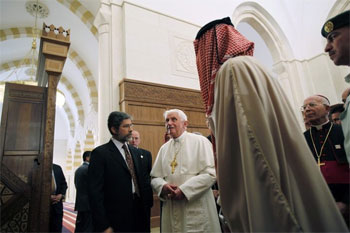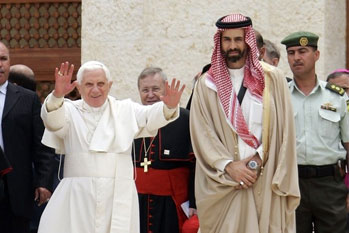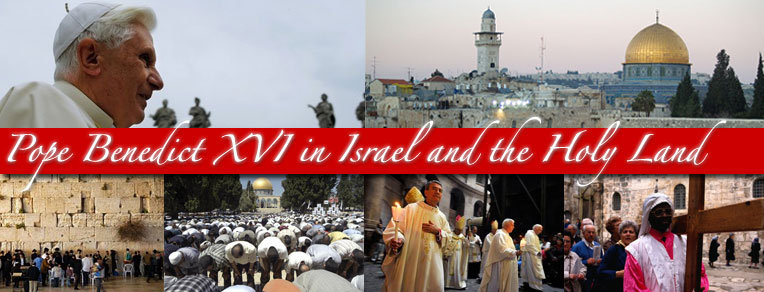Places of worship, like this splendid Al-Hussein Bin Talal mosque named after the revered late King, stand out like jewels across the earth’s surface. From the ancient to the modern, the magnificent to the humble, they all point to the divine, to the Transcendent One, to the Almighty. And through the centuries these sanctuaries have drawn men and women into their sacred space to pause, to pray, to acknowledge the presence of the Almighty, and to recognize that we are all his creatures.For this reason we cannot fail to be concerned that today, with increasing insistency, some maintain that religion fails in its claim to be, by nature, a builder of unity and harmony, an expression of communion between persons and with God. Indeed some assert that religion is necessarily a cause of division in our world; and so they argue that the less attention given to religion in the public sphere the better. Certainly, the contradiction of tensions and divisions between the followers of different religious traditions, sadly, cannot be denied. However, is it not also the case that often it is the ideological manipulation of religion, sometimes for political ends, that is the real catalyst for tension and division, and at times even violence in society?
In the face of this situation, where the opponents of religion seek not simply to silence its voice but to replace it with their own, the need for believers to be true to their principles and beliefs is felt all the more keenly. Muslims and Christians, precisely because of the burden of our common history so often marked by misunderstanding, must today strive to be known and recognized as worshippers of God faithful to prayer, eager to uphold and live by the Almighty’s decrees, merciful and compassionate, consistent in bearing witness to all that is true and good, and ever mindful of the common origin and dignity of all human persons, who remain at the apex of God’s creative design for the world and for history.

Distinguished friends, today I wish to refer to a task which I have addressed on a number of occasions and which I firmly believe Christians and Muslims can embrace, particularly through our respective contributions to learning and scholarship, and public service. That task is the challenge to cultivate for the good, in the context of faith and truth, the vast potential of human reason. Christians in fact describe God, among other ways, as creative Reason, which orders and guides the world. And God endows us with the capacity to participate in his reason and thus to act in accordance with what is good. Muslims worship God, the Creator of Heaven and Earth, who has spoken to humanity. And as believers in the one God we know that human reason is itself God’s gift and that it soars to its highest plane when suffused with the light of God’s truth. In fact, when human reason humbly allows itself to be purified by faith, it is far from weakened; rather, it is strengthened to resist presumption and to reach beyond its own limitations. In this way, human reason is emboldened to pursue its noble purpose of serving mankind, giving expression to our deepest common aspirations and extending, rather than manipulating or confining, public debate. Thus, genuine adherence to religion – far from narrowing our minds – widens the horizon of human understanding. It protects civil society from the excesses of the unbridled ego which tend to absolutize the finite and eclipse the infinite; it ensures that freedom is exercised hand in hand with truth, and it adorns culture with insights concerning all that is true, good and beautiful.

This understanding of reason, which continually draws the human mind beyond itself in the quest for the Absolute, poses a challenge; it contains a sense of both hope and caution. Together, Christians and Muslims are impelled to seek all that is just and right. We are bound to step beyond our particular interests and to encourage others, civil servants and leaders in particular, to do likewise in order to embrace the profound satisfaction of serving the common good, even at personal cost. And we are reminded that because it is our common human dignity which gives rise to universal human rights, they hold equally for every man and woman, irrespective of his or her religious, social or ethnic group. In this regard, we must note that the right of religious freedom extends beyond the question of worship and includes the right – especially of minorities – to fair access to the employment market and other spheres of civic life.










Apparently, the wanted another "apology" which was not forthcoming...
ReplyDeleteSeems to me we have been waiting for their apologies for the last 1400 years of murdering Catholics in the name of Allah & Muhammad!!!!